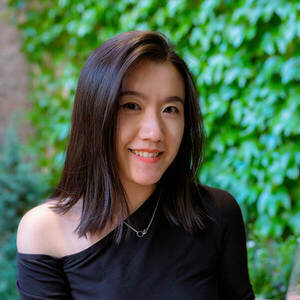Lingyu Yang (Schaefer Group)
Developing a New Polymer Platform for Alkaline Fuel Cell Membranes
January 18, 2023

Lingyu Yang is a fourth-year graduate student advised by Jennifer Schaefer, associate professor in the Department of Chemical and Biomolecular Engineering at the University of Notre Dame. She presented "Developing a New Polymer Platform for Alkaline Fuel Cell Membranes" at the ND Energy PD&GS Seminar in January 2023.
Yang received a 2022 Patrick and Jana Eilers Graduate Student Fellowship for her research focused on developing efficient methods for energy use and storage, particularly in the form of batteries and fuel cells. Yang’s fellowship project included a collaboration with another ND Energy affiliated research group, the laboratory of Haifeng Gao, associate professor in the Department of Chemistry and Biochemistry.
Fuel cells are electrochemical energy devices that can convert chemical fuels to electricity at higher efficiency than combustion power plants, and reversible fuel cells can operate as energy storage devices by converting electricity to chemical fuel. The potential of this clean energy technology has motivated Yang to continue working toward discovering new types of electrolytes that are more efficient, longer-lasting, and better for the environment.
Yang is concentrating specifically on anion exchange membrane (AEM) fuel cells, which offer several advantages over proton exchange membrane (PEM) fuel cells, including a wider selection of electrocatalysts, less metal corrosion, and lower cost.
“I work on developing ion conductors for alkaline fuel cells and solid-state Li-ion battery applications,” Yang said. “Overall, the ultimate goal of my research is to create a cleaner, more sustainable energy system that can power our world without harming the environment.”
Drawn to Notre Dame for its prestigious reputation in academic excellence, Yang found the University’s environment to be the right place to pursue a Ph.D. and seek solutions for a clean energy future. Its interdisciplinary programs, collaborative atmosphere, and abundant resources has allowed Yang to apply her chemistry background with a more practical focus in chemical engineering to pursue her research interests.
“There are many fascinating technical challenges to overcome in developing better batteries and fuel cells,” Yang said. “Energy-related research is essential for a sustainable future and affects our daily lives in many ways.”
Yang uses several instruments in ND Energy’s Materials Characterization Facility (MCF) to conduct her research, including the Hybrid Rheometer, FTIR, Confocal Raman Microscope, High-Res XRD, and UV-Vis. She also uses the scanning electron microscopy capabilities at the Notre Dame Integrated Imaging Facility.
“Both Ian Lightcap and Anna Matzner help me a lot in instrument training and troubleshooting,” Yang said. Yang and Matzner worked together for nearly a year to fix a Hybrid Rheometer environmental chamber, which is now available to other researchers on campus.
Collaboration with graduate students in the Department of Chemistry and Biochemistry has been paramount to the success of Yang’s research efforts. In addition to working with various partners on campus, she has also run X-ray scattering experiments at Argonne National Laboratory.
“Their backgrounds in organic chemistry and physics definitely helped me in the polymer synthesis and characterization data analysis,” she said of the importance of interacting with researchers from diverse backgrounds and disciplines.
Outside of her work in the lab, Yang serves as the social chair of the Chemical and Biomolecular Engineering Graduate Student Organization and secretary of the Electrochemical Society’s Notre Dame Student Chapter. She also directs outreach for the Chemical and Biomolecular Engineering symposium committee.
Prior to coming to Notre Dame, Yang attended Sichuan University in Chengdu, China, where she completed her undergraduate studies in chemistry.